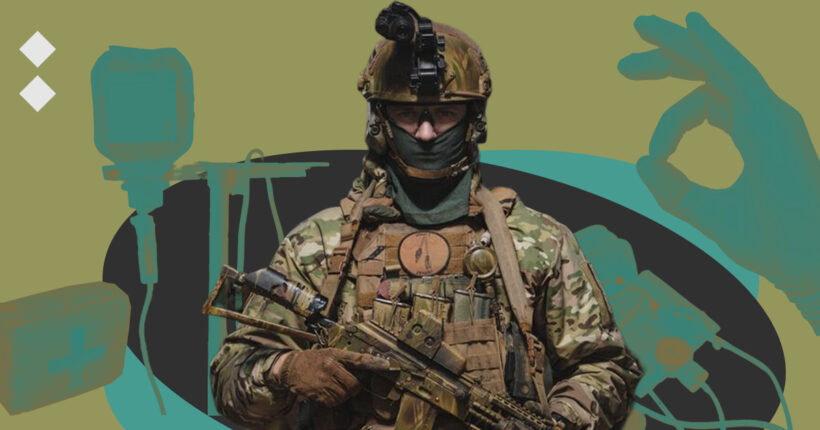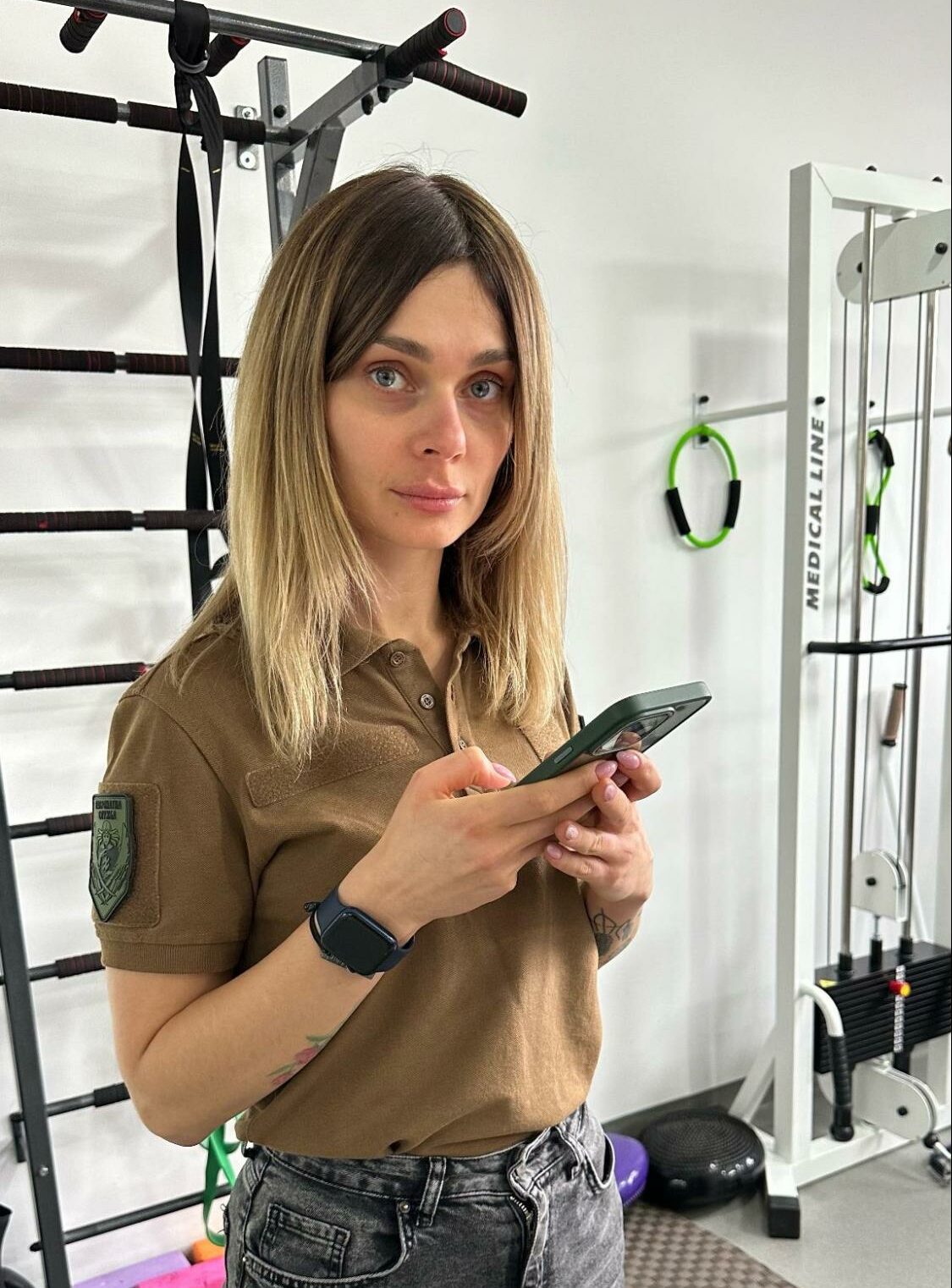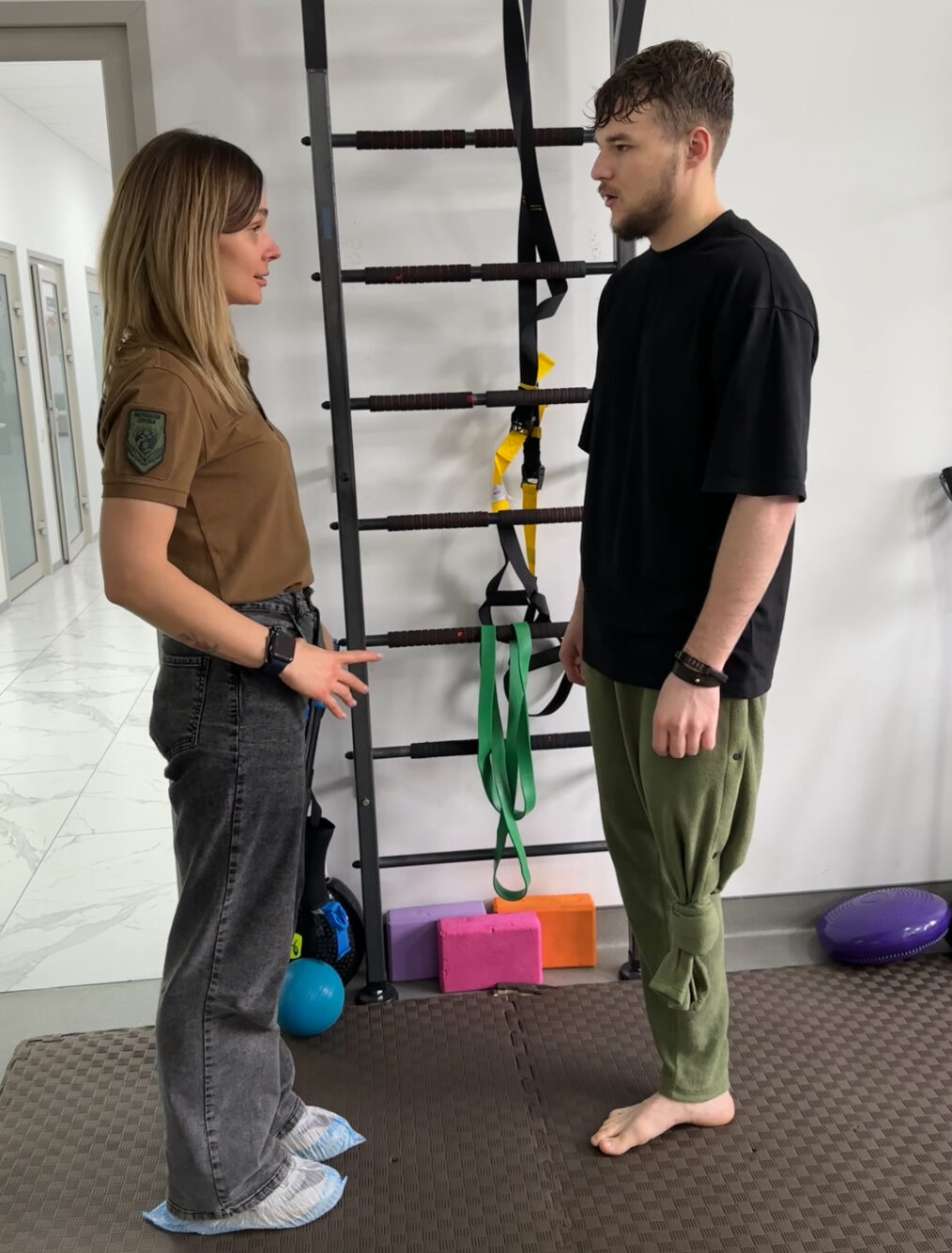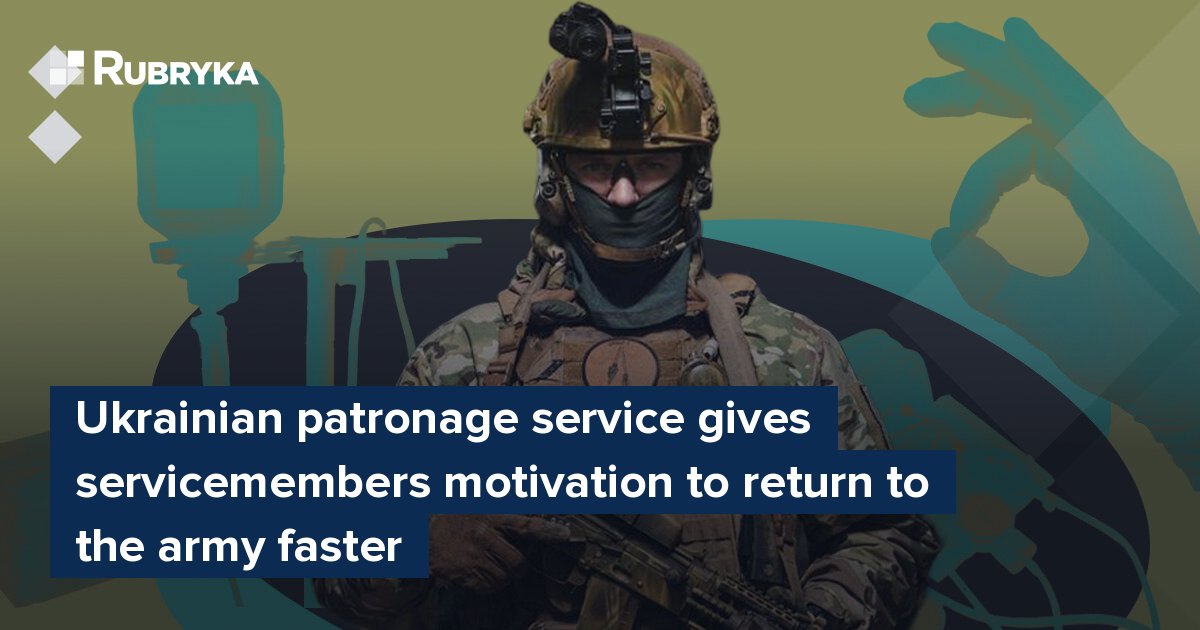
What is the problem?
Despite the fact that war in Ukraine's east started in 2014, Ukraine did not build a network of strong rehabilitation centers and did not take much care of this issue. Only in July 2023 was a new concept of forming a network of rehabilitation centers approved. It envisages the creation of more than 7,000 beds for patients with injuries, illnesses, and wounds that require an active recovery process. However, the wounded need proper help already now.
21-year-old Jeb is undergoing rehabilitation after his second injury. He wanted to join the army at the beginning of a full-scale invasion. However, after going through all Kyiv military commissariats, he was rejected everywhere because, at that time, he had just turned 19. He decided to wait for recruitment to Azov regiment.

Jeb while on duty. Photo from the hero's personal archive
On October 17, 2022, Jeb began the basic combat training course — the first the brigade conducted after the Mariupol campaign. Jeb went on combat missions already in November — first as a shooter, and later, he studied for a more narrow-profile specialty of a grenade launcher. Later, he became the commander of the department.
In combat soldier received the wound, after which he is currently undergoing rehabilitation. After the assault, Jeb and his comrade were already returning to their positions but were shot with a machine gun. Jeb was wounded in the leg, and another fighter was wounded in the arm. They were evacuated from the battlefield.
"This was not my first evacuation, so I did not expect anything good. It's going to be long, it's going to be boring, it's going to hurt," says Jeb calmly, and after a short pause, he continues: "I had a mental checkpoint — to wait for the painkiller."
Jeb does not remember well what happened next because the medicine had already taken effect. He recalls how he was brought to the stabilization point. There, the medics could not do anything except to convert the tourniquets — further help was already provided to him in Sloviansk.
Jeb had two bullet wounds — one above the knee and the other directly in the kneecap. The leg could not be saved and had to be amputated.
"I don't remember all that because I was put into a medicated coma," the soldier adds.
What is the solution?
Jeb came to his senses already in Dnipro. The next day, he received a new cellphone with the phone number of the patronage service and its curator, Alina Shynkovych.
While the soldier was in Dnipro, they spoke on the phone. He called or wrote what he needed; curators from the local patronage service looked for that and brought it.

Alina Shynkovych is one of the curators of the Patronage Service.
She says that the patronage service follows the soldiers from the moment of their injury. They are immediately informed about a soldier with an injury, and they try to contact this soldier. If this is not possible, the medical supervisors start looking for the wounded person in all hospitals. Usually, they already know where and from which area they will be bringing a person.
Soldiers are provided with the necessary first aid items when they are found. At first, the patronage service provides absolutely everything for the wounded. If a soldier has no phone, one is bought for him. This is one of the most important conditions of service — the wounded must be constantly in touch.
If additional examinations, medicines, or consultations with narrow-profile specialists are necessary, the service curators also deal with this. They also help the injured to deal with documents. According to Jeb, such conditions were created so he could direct all his energies exclusively to recovery.
How does it work?
The Azov Angels patronage service was formed in 2014 with the Azov battalion. It all started with Olena Tolkachova, the service's founder and head. After her comrades in the Revolution of Dignity went to fight in the east, Tolkachova realized she had to help them. The help was needed with almost everything since the country was not ready for war.

Olena Tolkachova. Photo: UP
While working in the mobilization center, Tolkachova was alone at first, and later, two more volunteers joined her. Together, they looked for the necessary medicines, helped the wounded with rehabilitation and prosthetics, provided psychological support, and provided material support for the soldiers — back then, everyone did what they could. When the first casualties appeared, they began to notify their relatives.
After the start of the full-scale war on February 24, 2022, the load on the service increased several times. Previously, they took care of approximately two thousand service members. Now they are helping the 12th special purpose brigade Azov of the National Guard of Ukraine and the 3rd separate assault brigade of the Armed Forces of Ukraine — that's more than 10 thousand soldiers. These changes required a clear structure, so the entire service functionality was distributed among six departments.
Ten people work with the wounded in the largest department — their main task is to accompany soldiers from the moment of injury to the end of rehabilitation. This is where Jeb's curator, Alina Shynkovych, works. She also realized after February 24 that she could not simply sit at home and live her life.
Having only motivation, without professional education or specific experience, she filled out a form on the website, passed an interview, and became a medical curator. During eight months of work in the service, there was a moment when she took care of a hundred soldiers at the same time.
"It's hard, but you understand you're doing important work. It is important for the soldiers because it is morally easier for them when they realize they are not alone with their injury," says the curator.
Another service department works with prisoners of war, missing persons, and their families. They help fighters who have been returned from captivity restore their documents and provide legal advice. Department employees also collect information about their comrades in uncontrolled territory from those released.
Together with the structures responsible for exchanges, information monitoring, and work on missing persons, the service deals with the return of prisoners and helps their families. Unfortunately, the duties of the employees of this department also include identifying the bodies of the deceased.
Soldiers who died at the front are taken care of by the department for work with the fallen and their families. Their main tasks are to carry out an honorable burial and support the relatives. The service helps solve legal issues, and if necessary, they are ready to look for qualified lawyers. They connect relatives with responsible unit officers and establish communication between them.
After the death of a soldier, the department's employees cooperate with pre-trial investigation bodies and several other services. They carry the body of the deceased from the evacuation point to the burial place.
The service also organizes an honoring farewell to a soldier and arranges places of burial/cremation. In certain cases, applications for honors are submitted: orchestra, guard of honor, etc. The farewell takes place according to the wishes of the deceased or their relatives.
Although all the listed departments are ready to assist military relatives, the service still has a separate department for working with families. In addition to legal and financial assistance, they involve relatives in various activities, such as children's camps or educational programs.

Part of the patronage service team. Collage from the website Azov Angels
Employees of this department monitor the worthy commemoration of the military. They contribute to installing commemorative plaques, renaming streets, and other actions aimed at this.
The logistics department is responsible for various transportation. Many employees there are wounded soldiers who decided to remain in the service. In addition to transportation, they also look for necessary medicines, deal with documentation, and help the wounded.
Another component of the service is the media department. Employees maintain social networks and communicate with the mass media so that as many people as possible learn about the activities of the patronage service. They involve Ukrainians who care about content creation — those who know how to photograph, shoot, and edit can cooperate with this department.
In total, more than 50 employees work in the patronage service. Most of them are members of the Azov movement who were activists or volunteers. Another part of the employees came to the service through recruiting centers. However, to create a similar service in other brigades, looking for new people is unnecessary. People from the medical forces, civil-military cooperation services, and moral and psychological support can join.
However, in addition to people, the patronage service also requires money. Depending on the intensity of hostilities or the number of prisoner exchanges, the monthly budget varies from ₴10 to 15 million. They are collected through the Azov Angels fund, support services, and responsible businesses.
Creating such a service in other units means supporting, healing, and motivating service members. Since the beginning of the full-scale invasion, the Azov Angels patronage service has helped treat almost five thousand wounded and their families. After treatment and rehabilitation, more than 80% of wounded defenders return to the army ranks.
Does it really work?
Jeb's experience
The story of Jeb did not end with just one hospital. When the soldier's condition stabilized, he was taken to Kyiv since he lived here before his service. He continued his treatment at the Central Polyclinic of the Ministry of Internal Affairs, where he met his curator live. Shynkovych came to see him in the hospital the day after Jeb was transported to Kyiv.
"When you see a wounded person, you already know more about their condition. When you talk on the phone, they usually say they are fine," Shynkovych emphasizes.

Alina Shynkovych with Jeb.
The injured person is given basic examinations in the hospital, and treatment continues. All this time, the curator is constantly in touch with the soldier. At this stage, the patronage service also helps the fighters with everything they need. It can be some medicines, moral support, specific doctors, or help to loved ones.
Usually, if the fighter is conscious, curators do not need to communicate with relatives. However, if relatives have questions, they can easily take the curator's number and contact them.
When the time comes for the soldier to be discharged from the hospital and begin rehabilitation, the curator offers the soldier several clinics with which the service cooperates. Then, the injured person is transported for further rehabilitation. If necessary, they also provide additional treatment and prosthetics.
Now, Jeb works with rehabilitators — performs exercises for different muscle groups and general physical activity. He is also receiving massages and neurostimulation at the hospital. "They give you an electric shock to relax you," the soldier explains. At the same time, a stump, a part of the amputated limb, is hammered into him to reduce it and prepare it for prosthetics.
According to the service member, thanks to the patronage service, he has no problems with rehabilitation. In private clinics, each fighter has their own approach and individual assistance.
During rehabilitation, the patronage service also cares for the soldier's mental health. If a person has PTSD or problems with adaptation in society, they will find a specialist for them.
Another issue that the patronage service takes on is bureaucracy. Jeb says that they recently introduced a new certificate that is necessary to get a prosthesis. Shynkovych was engaged in all this, allowing the military to focus on rehabilitation. She went to the National Medical Center and took care of the documents so the soldier could continue with the prosthetics process.
Jeb mentions the importance of the patronage service's work, speaking about his comrades from neighboring units. They have to deal with everything independently and at their own expense. Lying in the hospital, they have to look for a place for rehabilitation, get various documents, and think about what to do next.
The thought that in case of injury, capture, or death, you and your family will be taken care of adds twice as much confidence, says the servicemember.
"I believe 100% that they will not forget me and take care of me in case of anything. It motivates me to return to the formation as soon as possible to continue the work that has already been started," concludes Jeb.
If you'd like to support the work of Azov Angels patronage service, follow the link for further information.
Newsletter
Digest of the most interesting news: just about the main thing








